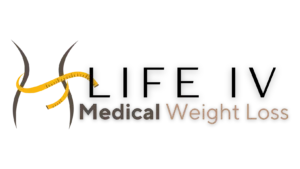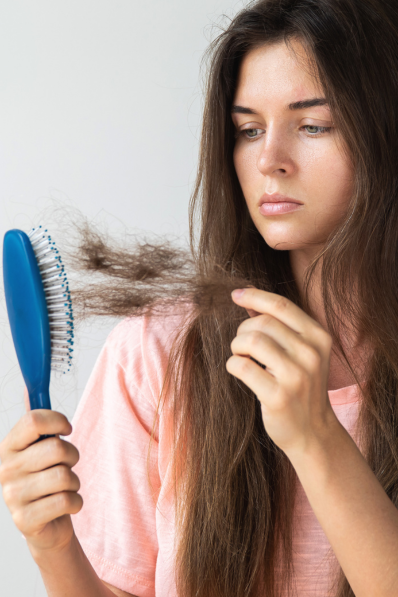Many people seek weight loss, often for health or aesthetic reasons. However, can weight loss cause hair loss? A lesser-known side effect of rapid or significant weight loss is hair loss. This comprehensive guide explores how weight loss can lead to hair loss, the underlying mechanisms, and how to prevent and treat this condition while still achieving your weight loss goals.
Last Updated on August 14, 2024 by justin@lifeivtherapy.com
Can Weight Loss Cause Hair Loss? A Comprehensive Guide to Prevention and Treatment
Understanding Hair Growth and Hair Loss
The Hair Growth Cycle
To understand how weight loss impacts hair health, it’s essential to grasp the basics of the hair growth cycle. Hair grows in a cyclical process that includes three phases:
Anagen Phase
The anagen phase is the growth phase, where hair actively grows from the hair follicle. This phase can last anywhere from 2 to 7 years, depending on genetic factors.
Catagen Phase
The catagen phase is a transitional period that lasts about 2 to 3 weeks. During this phase, hair stops growing and detaches from the blood supply.
Telogen Phase
The telogen phase is the resting phase, lasting around 3 to 4 months. At the end of this phase, the hair falls out, and new hair begins to grow from the follicle, starting the cycle anew.
What is Telogen Effluvium?
Telogen effluvium is a condition where a significant number of hair follicles enter the telogen phase prematurely, leading to widespread hair shedding. This condition is often triggered by physical or emotional stress, including the stress that rapid weight loss can place on the body.
How Can Weight Loss Cause Hair Loss?
Nutritional Deficiencies
One of the primary reasons weight loss can cause hair loss is nutritional deficiency. Rapid or restrictive dieting can lead to a lack of essential nutrients that are critical for hair health. Nutrients such as iron, zinc, and vitamin D are particularly important for maintaining healthy hair growth.
Iron Deficiency
Iron plays a crucial role in the production of hemoglobin, which carries oxygen to hair follicles. A deficiency in iron can lead to reduced oxygen supply, weakening the hair and leading to hair loss.
Zinc Deficiency
Zinc is vital for cell division and hair follicle health. A lack of zinc can disrupt the hair growth cycle, pushing more hairs into the telogen phase prematurely.
Vitamin D Deficiency
Vitamin D is essential for hair follicle cycling. Without sufficient vitamin D, hair follicles can become dormant, leading to hair thinning and loss.
The Role of Stress in Hair Loss
Can weight loss cause hair loss? Absolutely! Weight loss, especially when achieved rapidly, can be a significant stressor on the body. This stress can trigger telogen effluvium, causing more hair follicles to enter the resting phase simultaneously, leading to noticeable hair shedding.
Impact of Weight Loss Surgery on Hair Health
Weight loss surgeries, such as gastric bypass or sleeve gastrectomy, can lead to rapid weight loss and nutrient malabsorption. This can exacerbate the risk of hair loss due to deficiencies in essential vitamins and minerals. Which further enhances the point that weight can cause hair loss.
Prevention of Hair Loss During Weight Loss
Adopt a Balanced Diet
The most effective way to prevent hair loss during weight loss is to ensure a balanced diet that includes all essential nutrients. Here are some key nutrients to focus on:
Iron
Include iron-rich foods such as spinach, red meat, lentils, and quinoa in your diet to prevent iron deficiency.
Zinc
Ensure adequate zinc intake by consuming foods like nuts, seeds, shellfish, and dairy products.
Vitamin D
Vitamin D can be obtained through sun exposure and foods like fatty fish, eggs, and fortified dairy products. Supplementation may also be necessary in some cases.
Consider Supplements
If your diet is lacking in certain nutrients, consider taking supplements to fill the gaps. However, always consult with a healthcare provider before starting any supplementation regimen.
Avoid Crash Diets
Crash diets that involve extreme calorie restriction can lead to nutrient deficiencies and stress on the body, increasing the risk of hair loss. Instead, aim for a gradual and sustainable weight loss plan.
Manage Stress Levels
Incorporate stress-reducing activities into your routine, such as yoga, meditation, or regular exercise, to minimize the impact of stress on your hair health.
Treatment of Hair Loss After Weight Loss
Re-Evaluate Your Diet
If you are experiencing hair loss after weight loss, the first step is to re-evaluate your diet. Ensure that you are consuming sufficient calories and nutrients to support hair growth.
Consult a Healthcare Provider
It is important to consult with a healthcare provider if you experience significant hair loss. They can assess your nutritional status and recommend appropriate treatments or supplements.
Topical Treatments
Topical treatments, such as minoxidil, can help stimulate hair growth and reduce hair loss. However, these should be used under the guidance of a healthcare provider.
Patience and Time
Telogen effluvium is usually temporary, and hair growth typically resumes within 6 to 9 months after the initial stressor is resolved. Patience is key, as it may take time for your hair to return to its normal state.
FAQs: Weight Loss and Hair Loss
Can losing weight too quickly cause hair loss?
Yes, rapid weight loss can cause hair loss due to stress on the body and potential nutrient deficiencies. It’s important to lose weight at a gradual, sustainable pace to minimize this risk.
Will my hair grow back after weight loss?
In most cases, hair loss after weight loss is temporary. Once the body adjusts and nutrient levels are restored, hair growth usually resumes within 6 to 9 months.
How can I prevent hair loss while dieting?
Knowing that weight loss can cause hair loss, there are ways to prevent it. To prevent hair loss while dieting, focus on maintaining a balanced diet rich in essential nutrients, avoid crash diets, manage stress, and consider supplements if necessary.
What are the best foods for preventing hair loss?
Foods rich in iron, zinc, and vitamin D are particularly important for preventing hair loss. Include foods like spinach, nuts, seeds, eggs, and fatty fish in your diet.
Conclusion
Hair loss after weight loss can be a distressing side effect, but it is usually temporary and preventable with the right approach. By focusing on a balanced diet, managing stress, and taking care of your overall health, you can achieve your weight loss goals without compromising your hair health. If you experience significant hair loss, consult with a healthcare provider to determine the best course of action.

